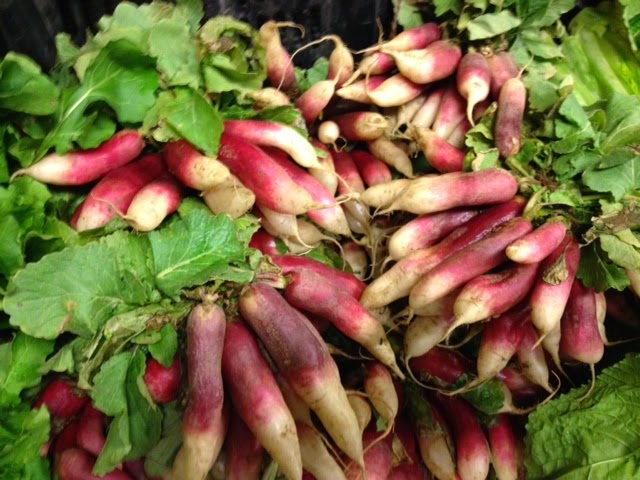Maria
Rodale, Organic Manifesto
Long ago, and in a place very far from here, there lived a
young couple. They were both tremendously poor, and they—or rather, one of them
was pregnant. She had cravings, as pregnant women reportedly do. But not
cravings of pickles and ice cream.
With the hunger of a thousand mouths, she craved radishes.
The only place that was on the bus line, open at that time, and sure to have
radishes, was Whole Foods. And their radishes were too expensive.
“You know,” she spat, “you sound
just like one of those entitled d-bags that would rather save for an xbox than
buy real food. Just like Maria Rodale
writes in The Organic Manifesto,
‘Sometimes I think the people who complain about Whole Foods don’t remember
what it was life before Whole Foods’!!!! That’s on page 129, you poor fool.”
So, out he went for organic, local, non GMO, hormone-free,
grass fed, free range, happy radishes. He ruminates about the economy, his
inability to provide properly, the state of agriculture in America, and other
sad things.
He finds himself at his favorite spot to have a wander and a
think--the community garden in the good part of town. They don’t have a membership,
they think they could not afford it. His armchair-Marxism stirs inside his red
red blood. Community Gardens for the Community!
Guided by the light of his refurbished iphone, he weaves
through the carefully tended allotments. He crunches through kale and kohlrabi,
and clomps through cabbage and collards. At last! A patch of pert, green, prickly
pony tails spilled from tiny pink scalps.
Gritty and chilled, he wanders home with full arms. All
aglow, his wife alternates between crunching on the red gems and kissing his
frozen fingers. They lay in bed happy and tingly from the bounty.
They feast on radish greens with gas station bacon and
syrupy balsamic, mini-radish latkes, mayo-slathered radishes, tuna-radish
salad, radish puree on cornmeal mush, radish greens gratin, and boxed wine
poached radishes. This last one is horrid, but she loves the taste without the
threat of alcohol.
It is a radish wonderland. Well, until it is not. One night
in the midst of his gleaning, a bony hand digs into the scruff of his neck and grinds
his face into the mud. Through dirty, broken teeth, he appeals to logos, pathos
and ethos. He explains himself to yellowed eyes shining angry in the dark.
We know how the story ends. The master of the bony hand and angry
eyes promised the poor man all the radishes he wanted for the duration of the pregnancy—with
the caveat that one day She would come to him with a demand that he would not
refuse.
The child is born, and named “Rapunzel,” a take on the Latin,
“Raphanus sativus,” aka radish. We know she is taken, kept in a tower,
something about Stevie Nicks-long hair, and a chivalric rescue. None of that is
the point.
The moral of the story comes at the beginning. Be careful
about your commitments. Once you start something, it must be finished. Remember
that which has gone dormant. Remember this as we head into winter.
It’s a story I think about as I pull radishes from my front
porch pots, and as I shirk my weekly blog commitment. Writers know the feel of
bony hands on our scruff. We know the feeling of mud in our mouths. Forgive us
our lapses and, for good or bad, in the presence of dormant things.
For more on the origins of the Rapunzel story:
The Organic Manifesto:








Good stuff, Darcy. This was a great read. Keep 'em comin'!
ReplyDeleteThank you, Zakia!
Delete